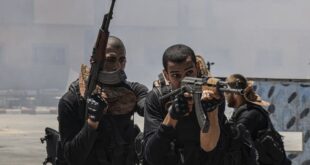GAZA CITY (AFP) — The Fateh Party of Mahmoud Abbas accused Hamas Saturday of courting civil war, as relations between the moderate Palestinian leader and the government hit crisis point less than a month after the Islamists took power. The war of words spilled over into violence later in the day, when some 15 people were wounded as student supporters of the two factions hurled stones at each other in Gaza City.
However, Fateh and Hamas leaders planned on meeting Saturday night in order to pull the sides back from the brink.
As tensions mounted, Fateh accused Hamas supremo Khaled Mishaal of being hysterical for saying on Friday, in a thinly veiled reference to Abbas, that the Palestinian president was part of a plot to remove Hamas from power.
“We view Khaled Mishaal’s speech with concern,” said an official Fateh statement, referring to the address delivered in a Damascus suburb.
“We can only describe this speech as divisive, because it aims to provoke tensions in the Palestinian territories and spark civil war.”
The war of words began when Abbas vetoed a Hamas government decision to create a new special force of armed activists headed by a wanted man.
The move, the first time Abbas has revoked a decision of the new Hamas-led government, followed US criticism of the security appointment and Israeli threats to target the man in question.
In response, Mishaal told his audience: “What is happening in Palestine is a policy carried out by a parallel government, a counter-government which deprives us of our prerogatives and the people of their rights. It is a plot.
“A certain part of our people is plotting against us. They are carrying out a premeditated plan which is aimed at our undoing.”
In its harsh response, Fateh said the speech was by “a man whose ambition is and always has been to cause Palestinian blood to flow … while he lives in (Damascus exile) and benefits from the experiences of certain people to provoke divisions and civil wars.”
It described Mishaal’s remarks as “hysterical,” and the speech as “full of plots, calumnies, lies and deception.”
Hamas and Fateh leaders were expected to hold “an emergency meeting” Saturday night to resolve the dispute, Hamas Spokesman Ghazi Hamad told AFP.
The session comes after a day of contacts between Abbas, Hamas premier Ismail Haniyah and a delegation of Egyptian security officials.
“We refuse the use of force or weapons against our citizens in the streets,” he added, referring to Saturday’s violence in Gaza City.
Since late Friday, pro-Abbas groups have been demonstrating in both the Gaza Strip and the West Bank.
Around 500 Aqsa members marched in the West Bank city of Ramallah, shouting: “Long live President Abbas” and “Khaled Mishaal wants to start a civil war.”
In Nablus, demonstrators shouted: “Mishaal has sold out to Syria and Iran,” while others temporarily occupied the courthouse and demanded an apology.
And in Gaza City, dozens of Fateh supporters at Azhar University, a strongly pro-Fateh institution, climbed on to the roof of a building, unfurled the party’s yellow flag and began throwing rocks on students at the Islamic University, next door.
The Islamist students, supporters of Hamas, stoned them back. At least 15 people were injured in the altercations.
Abbas and Hamas have been sharing power uneasily since Mishaal’s group won an upset victory in January general elections, unseating Fateh and ending its grip on power of more than a decade.
The moderate Palestinian Authority president is committed to negotiating a peace deal with Israel. Hamas continues to refuse even to recognise the Jewish state, much less renounce violence against it and honour previous Palestinian agreements.
On Thursday, Interior Minister Said Siam said he was creating a special security force of armed activists from armed factions to supplement the work of Palestinian police and security forces in clamping down on rampant chaos in the territories.
He named top Gaza-based activist Jamal Abu Samhadana, who is wanted in Israel for scores of attacks, to a senior position in the interior ministry to oversee various security elements, including the new force.
A Palestinian official said Abbas had drawn up a decree to reverse the decisions and that it had been approved by the executive committee of the Palestine Liberation Organisation on Friday.
Looking to cool the situation, Deputy Prime Minister Nassereddine Shaer issued a conciliatory statement, saying Mishaal’s remarks “do not represent the view of the Palestinian government.”
 Eurasia Press & News
Eurasia Press & News
